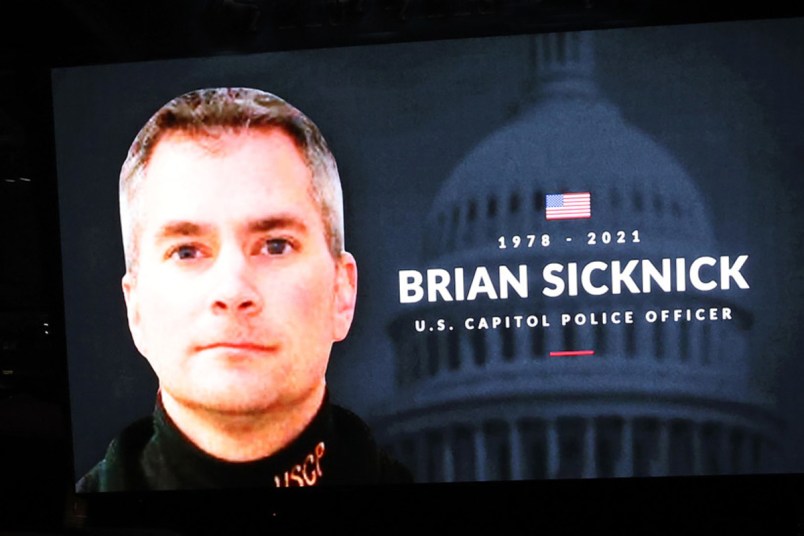More details have emerged regarding the death of Capitol Police Officer Brian Sicknick, whose passing was initially attributed to injuries sustained on-duty while responding to rioters during the deadly Capitol insurrection.
Lingering questions remained about the death of the Capitol Police officer, who died following the attack on the Capitol. Capitol Police said in a statement the night after the Capitol attack that Sicknick “was injured while physically engaging with protesters. He returned to his division office and collapsed. He was taken to a local hospital where he succumbed to his injuries.”
The exact circumstances of Sicknick’s death had not been publicly revealed at the time, but multiple outlets reported that he died after being struck in the head by a fire extinguisher. In March, prosecutors accused two individuals of assaulting Sicknick with chemical spray during the Capitol insurrection.
But an autopsy report by the District’s chief medical examiner released Monday suggests prosecutors may not press homicide charges in Sicknick’s death.
According to D.C.’s chief medical examiner, Sicknick suffered two strokes and died of natural causes a day after he confronted rioters during the breaching of the Capitol.
Francisco J. Diaz, the medical examiner, told the Washington Post that the autopsy found no evidence of Sicknick suffering an allergic reaction to chemical irritants. Diaz said that particular reaction would have caused Sicknick’s throat to quickly seize. Additionally, no evidence was found of Sicknick sustaining internal or external injuries, the Post reported.
Diaz acknowledged that Sicknick was among the officers who engaged with the pro-Trump mob that stormed that Capitol, and told the Post that “all that transpired played a role in his condition.”
Diaz said the autopsy found that Sicknick suffered two strokes at the base of the brain stem caused by a clot in an artery that supplies blood to that area of the body. The D.C. medical examiner could not confirm whether Sicknick had a preexisting medical condition due to privacy laws.
Responding to the D.C. medical examiner’s report, Capitol Police issued a statement saying that the department accepts its findings that Sicknick died of natural causes, but that it “does not change the fact Officer Sicknick died in the line of duty.”
The death of Sicknick is currently under investigation by D.C. police, the Capitol Police and the FBI. Acting U.S. Attorney Michael Sherwin told reporters during a call weeks after the Capitol attack that the FBI and U.S. Attorney’s office in Washington, D.C. have devoted a “specialized team” to investigate Sicknick’s death.



